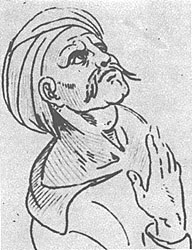|
Arab world. The guitar and mandolin are sisters to that wonderfully plaintive, pear-shaped stringed instrument, the oud, played at Arab American parties today. Interestingly, the bagpipe was first introduced into Europe by Crusaders returning from the wars in Palestine, and became identified particularly with the British Isles. Once the entertainment of the lonely Arab shepherd, the bagpipe returned to Palestine with the British Army. Several years ago, the international bagpipe competition was won by the bagpipe players of the Jordan Arab Army. This lost musical art was relearned during the period of Sir John Glubb�s (Glubb Pasha) re-organization and command of Jordan�s colorful Bedouin Corps.50 Arab poetry was put to music in the subtle delicacy of minor key sequences and rhythm, which today influence our ballads and folk songs. Extempore poetry was perfected into musical expression, and Arab weddings and other happy occasions are still celebrated with extempore versing and musical composition. Philosophy Arab philosophers made little distinction between Faith and scientific fact, letting one exist within the framework of the other. The Arab philosphers, after Byzantium, and beginning with Islamic culture, re-discovered the classic philosophy of Aristotle, Plotinus and Plato in looking for answers to the fundamental questions of God�s creation of the universe, the nature and destiny of the human soul, and the true existence of the seen and the unseen.
Among the well-known philosophers of the medieval world were Al-Kindi, who built upon Plato and Aristotle; Al-Farabi who made a model of Man's community; Avicenna (ibn-Sina) who evolved theories on form and matter that were incorporated into medieval Christian scholasticism; and Averroes, (ibn-Rushd) who inquired into the meaning of existence, providing Europe with its greatest understanding of Aristotle, and who, more than any other, influenced Western philosophy. Averroes was called the "soul and intelligence of Aristotle" by ibn-Maymun, the great Jewish philosopher better known as Maimonides, who was responsible for the establishment of an Averroist school. Thomas Aquinas, leaning heavily on the philosophy of Averroes, became Christendom's leading expert on Arab doctrines.51 In discussing the accomplishments of some of the medieval Arab scientists, artists, educators, philosophers, poets and musicians, and their gifts to western civilization, we should remember that their own thought was in turn, molded and shaped by many ancient cultures -- by Canaanite and other Near Eastern groups, by Egyptian, Greek, Roman cultures; and also by Chinese, Indian, and into the first centuries A.D., by some concepts of early Byzantium. Arab cultures, from the ancient to the present have given us three great monotheistic religions: Judaism, Christianity and Islam. In government and law, we refer to Hammurabi, the Babylonian, and Ulpian and Papinian, the Phoenicians. Nearly six hundred pieces of Papinian's writings were incorporated into Justinian's Digest of Law of the sixth century, A.D. The first four women to serve in the Roman Senate were Phoenicians (Lebanese) and all took the name of "Julia" to honor Caesar.
Probably the single greatest contribution of the Arabs to the Western world was the phonetic alphabet which determines the course of our daily communication. In all the exchanges of our daily lives, then, in our homes, offices and universities; in religion, philosophy, science and the arts; we are indebted to Arab creativity, insight and scientific perseverance. Averroes (1126-1196) ink drawing by Raphael |
